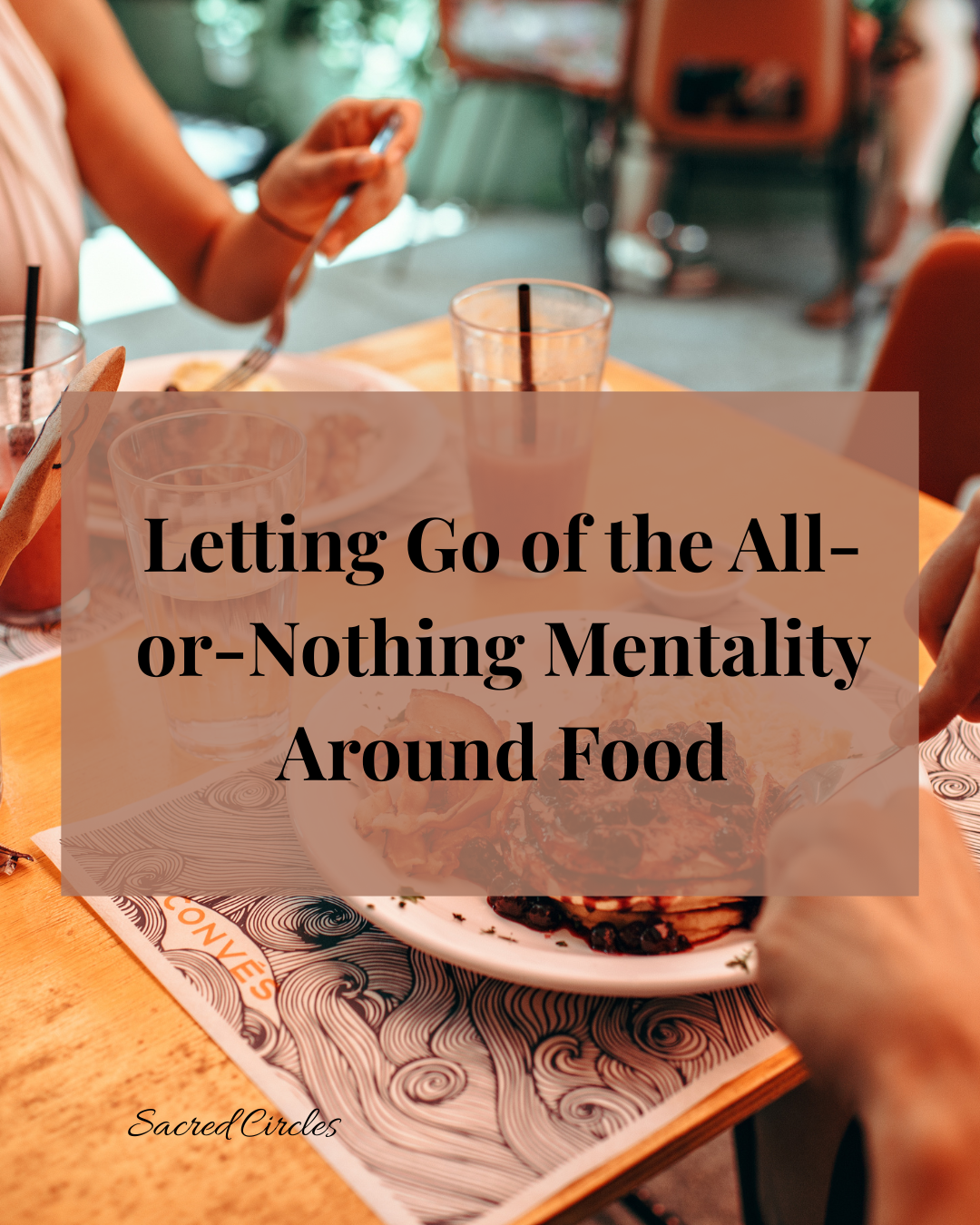Letting Go of the All-or-Nothing Mentality Around Food
If you’ve ever said, “I’ve already blown it today—I’ll start again Monday,” you’re not alone.
That familiar loop of “good” and “bad” eating, of control and rebellion, of discipline and shame—it’s one that so many women find themselves trapped in. And while it’s easy to believe that we just need more willpower, the truth is this pattern isn’t about food at all.
It’s about control, safety, and self-worth.
Why We Fall Into All-or-Nothing Thinking
Our brains and nervous systems love predictability. When life feels chaotic or overwhelming, we subconsciously look for something we can control—and food often becomes that outlet.
We label foods as good or bad, healthy or unhealthy, clean or dirty, believing that if we can just follow the rules perfectly, we’ll feel safe, successful, or worthy.
But this black-and-white thinking sets us up for failure from the start.
Because no one—no one—can live in constant perfection. Eventually, we eat the cookie, have the glass of wine, skip the workout, or order takeout after a long day. And when we do, that inner critic shows up fast: “I ruined everything. I might as well give up.”
That’s the moment when the pendulum swings from “all” to “nothing.” But real nourishment doesn’t exist at either extreme—it lives somewhere in the middle.
The Nervous System Connection
When we operate from an all-or-nothing place, our bodies are usually living in a state of stress. The sympathetic nervous system (your fight-or-flight response) thrives on rigidity and control. It wants certainty. It wants rules.
But your parasympathetic nervous system—the rest-and-digest state—requires softness. It’s where digestion, absorption, and true nourishment happen.
When you eat with guilt, fear, or shame, your body can’t fully receive what you’re giving it. When you eat with presence, compassion, and curiosity, you activate your body’s innate ability to digest, heal, and thrive.
What It Means to Live in the “In-Between”
Letting go of all-or-nothing isn’t about lowering your standards—it’s about releasing the belief that your worth is tied to perfection. It’s learning to meet yourself where you are.
It might look like:
Choosing the most nourishing option available instead of the “perfect” one.
Having a salad and dessert without labeling either as good or bad.
Listening to your body’s signals, even when they don’t match what your mind expects.
Beginning again—every meal, every moment—without shame.
Freedom lives in flexibility. When you allow yourself to be imperfect, you create space for consistency—and consistency is what builds true health over time.
A Practice to Try This Week
Notice your inner dialogue around food. Each time you catch yourself thinking in absolutes (“I always…” or “I never…”), pause and breathe.
Ask yourself:
What am I really craving right now—comfort, control, rest, nourishment, connection?
What would balance look like in this moment?
How can I honour my body without judgment?
These simple pauses begin to rewire your nervous system from control to care. They teach your body that safety can exist in flexibility.
Integration
Healing your relationship with food isn’t about finding the perfect plan—it’s about learning to listen.
It’s about compassion.
It’s about grace.
It’s about remembering that nourishment is a relationship, not a set of rules.
The more you practice meeting yourself with softness, the more your body begins to trust you again. And that trust?That’s where true transformation begins.
Want Support in This Process?
Inside the Sacred Circles Community, we explore these exact themes—how to regulate your nervous system, reconnect with your body’s wisdom, and build a relationship with food that’s rooted in intuition, not perfection.
You’ll find guided practices, resources, and a community of women walking this same path toward balance, awareness, and self-trust.
You can join us inside The Threshold, our free community space, and begin exploring your own rhythm with food and nourishment.

